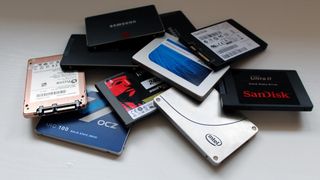Friendly reminder: stop procrastinating and back up your important files
A public service announcement to anyone who thinks their data is safe.

Earlier this week, one of our editors, Tyler, started having some issues with his primary PC. He powered it up and was greeted with the ominous warning that no boot devices were found. From there it was the usual troubleshooting steps. Power off, stare blankly at the innards of the computer, poke around at some cables, sacrifice a slide rule, hope for the best and power it back up. And then, as if by magic, everything worked and he was running Windows again, the warning perhaps unheeded. (It was probably a loose SATA cable, and not an SSD on its last legs.)
It got me thinking, though: When was the last time I backed up my critical files? Or to put a different spin on things, how many of the files on my PC would I be OK with losing? For many people, the answer to the second question is "none of them," while the answer to the first question is "uhh… is that something Windows does automatically?" It is not.
In the modern age of massive drives and fast solid-state storage, there's no good reason to not back up your important files. Multi-terabyte drives can hold years (decades even) of data, and they're relatively cheap. There are backup solutions that will upload your data into the cloud as well, though they require a subscription and of course you need to trust the company A) won't go bankrupt and vanish into the ether, and B) won't spy on or otherwise use your data.
There are plenty of reliable options, but for a basic backup all you really need is a decent external USB drive. If it doesn't come with its own backup software (many external drives do), grab some free backup software and configure it to your liking—or shoot for the cloud with Google's backup and sync, a basic but free tool if you trust the company with your stuff. You can also set it to use "high quality" encoded versions of your photos and movies with unlimited storage, if you don't mind the slight drop in quality.
If you go for local storage, you're not protected from things like theft or natural disaster, but it's better than skydiving without a parachute. Plug your drive in on a weekly or monthly basis, depending on how critical you feel your files are, and run your backup. Then breathe a little easier.
Whether it's cloud-based or local storage, the point I'm hoping to convey is that backups aren't all that hard, and they're important. It's generally possible to recover data from the platters in a hard drive, but it can cost over a thousand dollars, and recovering data from SSDs can be even more expensive. So if you haven't done so already, take a break from gaming and get a backup solution in place. It can be a lifesaver when the inevitable poop hits the fan.
The biggest gaming news, reviews and hardware deals
Keep up to date with the most important stories and the best deals, as picked by the PC Gamer team.
Jarred's love of computers dates back to the dark ages when his dad brought home a DOS 2.3 PC and he left his C-64 behind. He eventually built his first custom PC in 1990 with a 286 12MHz, only to discover it was already woefully outdated when Wing Commander was released a few months later. He holds a BS in Computer Science from Brigham Young University and has been working as a tech journalist since 2004, writing for AnandTech, Maximum PC, and PC Gamer. From the first S3 Virge '3D decelerators' to today's GPUs, Jarred keeps up with all the latest graphics trends and is the one to ask about game performance.

AMD's new Ryzen 7 9800X3D gaming CPU sold out almost instantly and scalpers are already selling the chips for up to $999

Simulated CPU-building speedrun attempt ends with a functioning processor in a mere six hours

Intel's Battlemage GPUs rumoured to arrive in December, well ahead of AMD and Nvidia's next-gen chips
Most Popular

